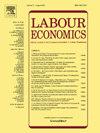All about the money? The gendered effect of education on industrial and occupational sorting
IF 2.6
2区 经济学
Q2 ECONOMICS
引用次数: 0
Abstract
Using the 1972 UK compulsory education reform as a natural experiment, we investigate the impact of education on occupational and industrial sorting through Quarterly Labour Force Surveys. Higher education levels increase the likelihood of men working in public administration and non-manual occupations. For women, it leads to a higher probability of employment in health and education industries. The shift of men towards non-manual occupations significantly boosts earnings, while the impact on women’s earnings is more limited. These findings echo gender differences in job characteristic preferences we show using UK International Social Survey Programme data. Men prioritise pecuniary aspects, while women prioritise pro-social aspects of their jobs. Importantly, greater education does not reduce these disparities in job preferences.
都是为了钱?教育对工业和职业分类的性别影响
利用1972年英国义务教育改革作为自然实验,我们通过季度劳动力调查调查了教育对职业和工业分类的影响。高等教育水平增加了男性从事公共行政和非体力职业的可能性。对妇女来说,它导致在卫生和教育行业就业的可能性更高。男性向非体力职业的转变显著提高了收入,而对女性收入的影响则较为有限。这些发现与我们使用英国国际社会调查项目数据显示的工作特征偏好的性别差异相呼应。男性优先考虑的是金钱方面的工作,而女性优先考虑的是对社会有益的工作。重要的是,高等教育并不能减少这些工作偏好上的差异。
本文章由计算机程序翻译,如有差异,请以英文原文为准。
求助全文
约1分钟内获得全文
求助全文
来源期刊

Labour Economics
ECONOMICS-
CiteScore
3.60
自引率
8.30%
发文量
142
期刊介绍:
Labour Economics is devoted to publishing research in the field of labour economics both on the microeconomic and on the macroeconomic level, in a balanced mix of theory, empirical testing and policy applications. It gives due recognition to analysis and explanation of institutional arrangements of national labour markets and the impact of these institutions on labour market outcomes.
 求助内容:
求助内容: 应助结果提醒方式:
应助结果提醒方式:


